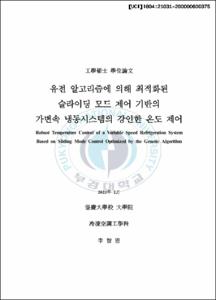유전 알고리즘에 의해 최적화된 슬라이딩 모드 제어 기반의 가변속 냉동시스템의 강인한 온도 제어
- Abstract
- Variable speed refrigeration systems (VSRSs) are widely used in various industrial fields due to their excellent energy saving ability and high-precision temperature control capability. VSRSs, which are composed of a variable speed compressor, an electronic expansion valve (EEV), and heat exchangers, have inherent nonlinear characteristics. Consequently, it is challenging to perform linear approximation modeling for VSRS controller design. Even a sophisticated numerical model in the form of a high-dimensional linear state-space model encounters difficulties in the suitable design of a VSRS control system due to the model uncertainties and disturbances including noises. Moreover, accurate identification of the system parameters in high-dimensional models for VSRSs is extremely laborious and tedious. Therefore, a control method that is based on a low-dimensional practical model for VSRSs and is robust against model uncertainties and disturbances must be formulated. The target temperature in VSRSs is controlled by regulating the mass flow rate of the refrigerant according to the change in the compressor rotation speed. Moreover, the superheat is controlled by adjusting the EEV opening angle to prevent adverse effects such as a decrease in the coefficient of performance (COP) due to superheated vapor compression and liquid back phenomenon. Therefore, the control system for a VSRS can be considered a multiple input/output (MIMO) system.
Sliding mode control (SMC) has attracted considerable attention as a robust control method for VSRSs. The SMC is based on variable structure control: the structure of the control system is changed, and the sliding mode is realized on the designed sliding plane (or line). Because the discontinuous control input of the SMC is independent of the system parameters of the nominal model, this control method is robust against model uncertainties and disturbances.
This paper proposes an SMC with a two-dimensional phase plane for a VSRS that is based on a low-dimensional practical state-space model. Using this approach, the proposed controller can render the behavior of state variables intuitively understandable and enhance the control performance. Moreover, the number of parameters to be identified, that can increase the model uncertainty, is significantly reduced, and modeling is facilitated. The state observer is composed of a Kalman filter to ensure robustness against process and observation noise. To suppress chattering due to the switching function, which is a notable problem in SMC, a saturation function is used instead of a signum function. Moreover, a feedforward controller is designed to avoid the deterioration in the transient characteristics of the main controlled variable due to the use of this saturation function. Furthermore, the genetic algorithm (GA) is used to avoid the cumbersome trial and error process for determining the design parameters of the saturation function, which influence the control performance, and for selecting the optimal values. The validity of the proposed controller is verified through simulations and experiments with a VSRS-based oil cooler system (OCS) as the plant. In addition, the effectiveness of the suggested controller is demonstrated by comparing the control performance with that of a conventional proportional–integral (PI) controller.
- Issued Date
- 2022
- Awarded Date
- 2022. 2
- Type
- Dissertation
- Keyword
- Variable speed refrigeration system(VSRS; 가변속 냉동시스템) Robust control(강인 제어) Sliding mode control(SMC; 슬라이딩 모드 제어) Kalman filter(칼만 필터) Feedforward control(피드포워드 제어) Genetic algorithm(GA; 유전 알고리즘)
- Publisher
- 부경대학교
- Affiliation
- 부경대학교 대학원
- Department
- 대학원 냉동공조공학과
- Advisor
- 정석권
- Table Of Contents
- 제1장 서 론 1
1.1 연구 배경 및 목적 1
1.2 연구 범위 및 내용 4
제2장 가변속 냉동시스템의 강인한 온도 제어 7
2.1 가변속 냉동시스템의 구성 및 제어 원리 7
2.2 가변속 냉동시스템 기반의 오일쿨러 시스템 9
2.3 가변 구조 SMC에 의한 강인한 온도 제어 10
제3장 가변속 냉동시스템의 상태 공간 모델링 13
3.1 온도 지령값(동작점) 및 정격 열부하 선정 13
3.2 가변속 냉동시스템의 동특성 전달함수 모델링 14
3.2.1 압축기 회전수 변화에 따른 오일출구온도의 동특성 16
3.2.2 EEV 개도 변화에 따른 과열도의 동특성 18
3.2.3 열부하 변동에 따른 오일출구온도의 동특성 19
3.2.4 압축기 회전수 변화에 따른 과열도의 동특성 20
3.3 Pade 근사에 의한 선형 2차원 상태 공간 모델링 21
제4장 강인한 온도 제어를 위한 SMC 설계 23
4.1 2차원 위상 평면을 갖는 SMC 설계 23
4.2 Lyapunov의 안정성 판별 27
4.3 불연속 제어 입력의 부호 함수로 인한 채터링 방지 31
4.4 상태 추정을 위한 칼만 상태관측기 설계 32
4.5 과도 응답 개선을 위한 피드포워드 제어기 설계 33
4.6 유전 알고리즘 기반 SMC의 설계 파라미터 최적화 33
제5장 MATLAB/Simulink 기반의 SMC 시뮬레이션 36
5.1 SMC 제어 성능 검증 시뮬레이션 조건 및 방법 36
5.2 Hankel의 특이치 분해의 타당성 분석 38
5.3 위상 평면상에서의 상태변수 거동 분석 42
5.4 칼만 상태관측기에 의한 상태 추정 성능 분석 45
5.5 칼만 상태관측기에 의한 외란 추정 성능 분석 48
5.6 불연속 제어 입력의 설계 49
5.7 SMC 설계 파라미터의 영향 분석 52
5.8 PI 제어기와의 제어 성능 비교 시뮬레이션 56
제6장 실험 결과 및 고찰 59
6.1 SMC의 제어 성능 검증 실험 59
6.2 PI 제어기와의 제어 성능 비교 실험 62
제7장 결 론 67
참고문헌 69
Appendix 72
학술지 게재 논문 및 학술대회 발표 논문 목록 92
- Degree
- Master
- Files in This Item:
-
-
Download
 유전 알고리즘에 의해 최적화된 슬라이딩 모드 제어 기반의 가변속 냉동시스템의 강인한 온도 제어.pdf
기타 데이터 / 2.43 MB / Adobe PDF
유전 알고리즘에 의해 최적화된 슬라이딩 모드 제어 기반의 가변속 냉동시스템의 강인한 온도 제어.pdf
기타 데이터 / 2.43 MB / Adobe PDF
-
Items in Repository are protected by copyright, with all rights reserved, unless otherwise indicated.